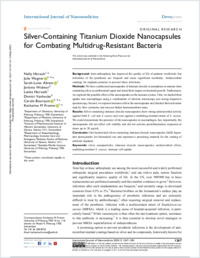Silver-containing titanium dioxide nanocapsules for combating multidrug-resistant bacteria
- Hérault, Nelly Department of Chemistry, University of Fribourg, Fribourg 1700, Switz erland
- Wagner, Julia Department of Medicine, University of Fribourg, Fribourg 1700, Switzerland -
- Abram, Sarah-Luise Department of Chemistry, University of Fribourg, Fribourg 1700, Switz erland
- Widmer, Jérôme Department of Medicine, University of Fribourg, Fribourg 1700, Switzerland
- Horvath, Lenke Department of Chemistry, University of Fribourg, Fribourg 1700, Switz erland
- Vanhecke, Dimitri Adolphe Merkle Institute, University of Fribourg, Fribourg 1700, Switzerland
- Bourquin, Carole Institute of Pharmaceutical Sciences of Western Switzerland, University of Geneva, Geneva 1211, Switzerland - Department of Anaesthesiology, Pharmacology, Intensive Care and Emergency Medicine, Faculty of Medicine, University of Geneva, Geneva 1211, Switzerland
- Fromm, Katharina M. Department of Chemistry, University of Fribourg, Fribourg 1700, Switz erland
-
2020
Published in:
- International Journal of Nanomedicine. - 2020, vol. Volume 15, p. 1267–1281
English
Background: Joint arthroplasty has improved the quality of life of patients worldwide, but infections of the prosthesis are frequent and cause significant morbidity. Antimicrobial coatings for implants promise to prevent these infections. Methods: We have synthesized nanocapsules of titanium dioxide in amorphous or anatase form containing silver as antibacterial agent and tested their impact on bacterial growth. Furthermore, we explored the possible effect of the nanocapsules on the immune system. First, we studied their uptake into macrophages using a combination of electron microscopy and energy- dispersive spectroscopy. Second, we exposed immune cells to the nanocapsules and checked their activation state by flow cytometry and enzyme- linked immunosorbent assay. Results: Silver-containing titanium dioxide nanocapsules show strong antimicrobial activity against both E. coli and S. aureus and even against a multidrug-resistant strain of S. aureus. We could demonstrate the presence of the nanocapsules in macrophages, but, importantly, the nanocapsules did not affect cell viability and did not activate proinflammatory responses at doses up to 20 μg/mL. Conclusion: Our bactericidal silver-containing titanium dioxide nanocapsules fulfill important prerequisites for biomedical use and represent a promising material for the coating of artificial implants.
- Faculty
- Faculté des sciences et de médecine
- Department
- Département de Chimie
- Language
-
- English
- Classification
- Chemistry
- License
-
License undefined
- Identifiers
-
- RERO DOC 328417
- DOI 10.2147/IJN.S231949
- Persistent URL
- https://folia.unifr.ch/unifr/documents/308588
Statistics
Document views: 121
File downloads:
- pdf: 301
